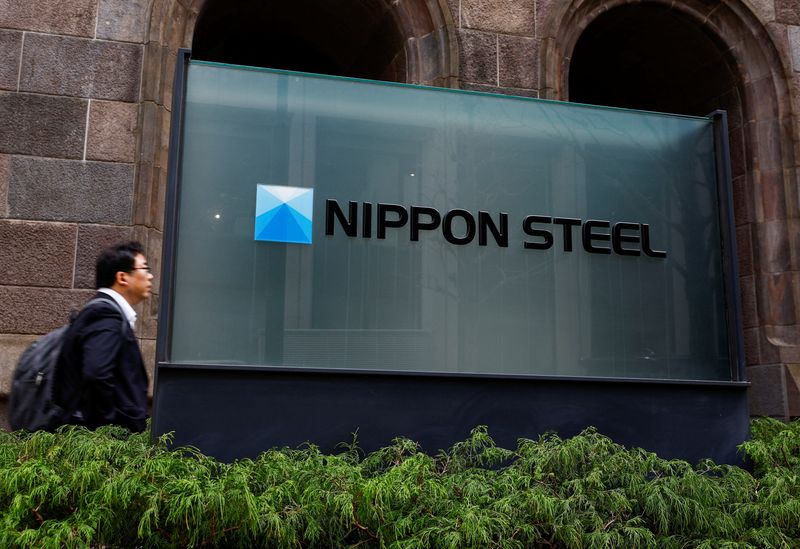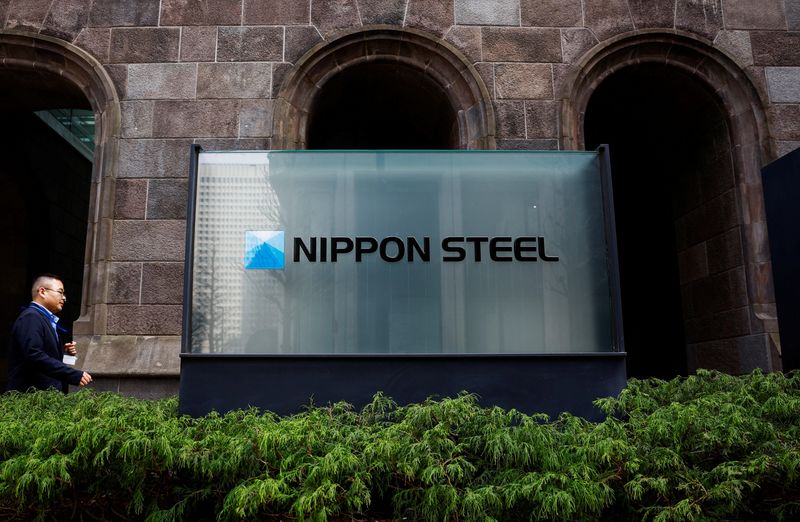By Alexandra Alper
WASHINGTON (Reuters) -Nippon Steel's proposed $14.9 billion takeover of U.S. Steel would create national security risks because it could hurt the supply of steel needed for critical transportation, construction and agriculture projects, the U.S. said in a letter sent to the companies and seen by Reuters.
The letter also cited a global glut of cheap Chinese steel, and said that under Nippon, a Japanese company, U.S. Steel would be less likely to seek tariffs on foreign steel importers.
The Committee on Foreign Investment in the U.S. (CFIUS) said in its 17-page letter sent on Saturday to Nippon Steel and U.S. Steel, and first reported by Reuters, that decisions by Nippon could "lead to a reduction in domestic steel production capacity."
CFIUS added: "While U.S. Steel frequently petitions for (trade) relief, Nippon Steel features prominently as a foreign respondent resisting trade relief for the U.S. domestic steel industry."
The letter provided a first glimpse of the national security grounds that the Biden administration could use as a basis for its expected move to block the merger, even as the companies and many industry experts questioned the strength of the arguments.
"By almost any measure, the issues identified by the committee are not ones that would fall into the national security bucket, but quite clearly into two others: Nationalistic trade protectionism and electoral politics," said Michael Leiter, a CFIUS lawyer in Washington, D.C. not involved in the deal.
If the government is "truly worried about maintaining steel supply here in the United States, the real solution is not to block this deal, but instead to use the CFIUS hammer to ensure that Nippon Steel makes and maintains such investments," he added.
The deal has become a political hot potato, with many Republican and Democratic lawmakers voicing opposition to it. Vice President and Democratic presidential candidate Kamala Harris said on Monday at a rally in Pennsylvania, the swing state where U.S. Steel is headquartered, that she wants U.S. Steel to remain "American owned and operated." Her Republican rival Donald Trump has pledged to block the deal if elected.
China looms large in the background of the trade concerns described by CFIUS. According to the committee, China's "persistent use of market-distorting government interventions" has allowed the country to unfairly gain dominance in the global steel market, as it exports extensive surplus steel that artificially lowers international prices.
It also cited 2022 data that showed China produced about 54% of total global crude steel and was the largest exporter.
In a 100-page response letter seen by Reuters and sent on Tuesday, Nippon Steel said it will invest billions of dollars to maintain and boost U.S. Steel facilities that otherwise would have been idled, "indisputably" allowing it to "maintain and potentially increase domestic steelmaking capacity in the United States."
Nippon also reaffirmed a promise not to transfer any U.S. Steel production capacity or jobs outside the U.S. and would not interfere in any of U.S. Steel's decisions on trade matters, including decisions to pursue trade measures under U.S. law against unfair trade practices.
The deal, Nippon added, would "create a stronger global competitor to China grounded in the close relationship between U.S. and Japan."
Nippon even proposed a national security agreement, aimed at assuaging CFIUS concerns, with pledges that a majority of U.S. Steel's board of directors would be non-dual U.S. citizens, including three independent directors approved by CFIUS to oversee compliance with the agreement.
"Nippon is throwing a financial lifeline to U.S. Steel while allowing it to remain led and managed by U.S. persons with government oversight," said Nicholas Klein, a CFIUS lawyer with DLA Piper. "I would think that CFIUS could mitigate the risk of reduction in steel production capacity through supply assurance and other common mitigation measures."

The committee, which reviews foreign investments for national security threats, also sees risk arising from Nippon's growing presence in India, where production costs are much lower than in the U.S.
"Nippon Steel has no economic incentive to, and will not, import Indian-origin...steel into the United States to compete with or undermine U.S. Steel, which would directly contradict the basis for Nippon Steel’s multi-billion dollar investment," the companies countered in their Tuesday letter.
